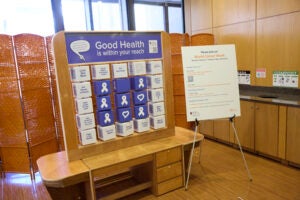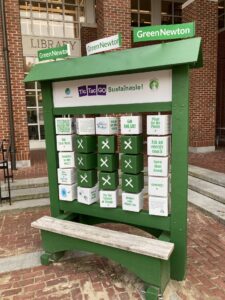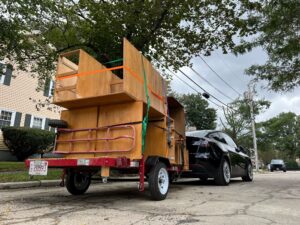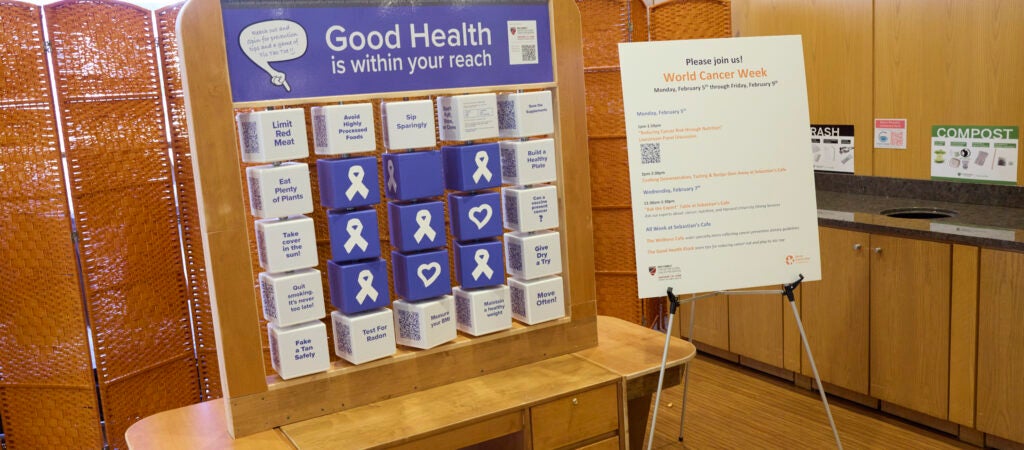Good Health is Within Your Reach!
The Good Health Kiosk is a public health education project of the Zhu Family Center for Global Cancer Prevention at the Harvard T.H. Chan School of Public Health. The white spinning blocks convey practical information for reducing your risk of cancer, while the blue blocks call for a quick game of tic-tac-toe and the bench provides a place to rest.

Interested in hosting the Good Health Kiosk? Email cgcp@hsph.harvard.edu for more information.
What’s the purpose?
More than 18 million people throughout the world will find out this year that they have cancer.
We want to reduce that number.
The risk of many kinds of cancer – such as skin cancer, or cancers linked to excess weight – can be reduced through behaviors such as avoiding exposure to the sun, or eating a healthy diet rich in produce, whole grains, and lean proteins. The kiosk provides simple, practical suggestions about actions you can take today to reduce your cancer risk – while providing a spot to sit and rest or enjoy a game of tic-tac-toe. QR codes on each block lead to trusted resources for getting assistance or learning more about each topic, such as support services for quitting smoking.
What are the sources of information found on the kiosk?
The cancer prevention information conveyed on the kiosk comes directly from the following sources:
American Association for Cancer Research
American Cancer Society
American Institute for Cancer Research
American Lung Association
Cancer Research UK
Centers for Disease Control and Prevention
Commonwealth of Massachusetts/mass.gov
Dana-Farber Cancer Institute
Hepatitis B Foundation
National Heart, Lung, and Blood Institute
National Institute on Drug Abuse
Minnesota Department of Public Health
Skin Cancer Foundation
University of Texas MD Anderson Cancer Center
US Department of Health & Human Services/Smokefree.gov
World Cancer Research Fund International
World Health Organization
The dietary recommendations were vetted by Mingyang Song, ScD, Associate Professor of Clinical Epidemiology and Nutrition, Department of Epidemiology, Harvard T.H. Chan School of Public Health.
Where will the kiosk go?
The Good Health Kiosk made its debut just prior to World Cancer Week (February 5 – February 9, 2024) in Sebastian’s Cafe on the campus of the Harvard T.H. Chan School of Public Health. From there, you will be able to follow its journey to other areas of campus, the city of Boston, and beyond with the hashtag #GoodHealthKiosk through the Zhu Center social media accounts:
Twitter @HSPHCancer
Instagram harvardchancancer
LinkedIn Harvard Chan Zhu Family Center for Global Cancer Prevention
Why does the Kiosk look like a… desk?

The initial inspiration for the Good Health Kiosk came from Green Newton’s Climate Kiosk. Designed by artist and set-designer Andrew Breithaupt, the Climate Kiosk offers tips for reducing one’s environmental impact through energy usage, transportation choices, diet, home maintenance, and similar topics.
Faithful to its purpose, over 90% of the materials used in the Climate Kiosk were reclaimed and sourced locally (thanks to the generosity of Sage Builders LLC).
Because reducing the incidence of cancer in the world extends beyond individual behaviors to mitigating and avoiding environmental pollution, we, too, wanted to use reclaimed materials for the Good Health Kiosk.
Luckily, Harvard University cares deeply about sustainability and commits to keeping usable materials out of the landfill through the Harvard Recycling and Surplus Center. The Center is a clearing house for furniture, office supplies, textiles, and other goods that, having served the University, are now ready for repurposing.
Among the file cabinets and desk chairs, Harvard dormitory desks are a mainstay at the Recycling and Surplus Center. Dormitory desks are ordinarily a difficult commodity for the Center to rehome due to their size and the sheer number of them that become available at one time. But as they are created out of a hard, solid wood, they proved an ideal material for repurposing into a kiosk! We are delighted that we could give these desks a new life as part of a kiosk that educates the public about cancer prevention.
To watch a short video created by the artist on the transformation process, click here.
The final kiosk design reflects input from the Harvard T.H. Chan School of Public Health community. The School’s faculty, staff, and students evaluated renderings of several different designs and color schemes, and we selected the design and scheme that were most favored by the community.

Fall 2023: Harvard University dormitory desks on their way to the workshop to become the Good Health Kiosk.
Give us your feedback via a quick survey!
About the artist:
Andrew Breithaupt is an illustrator, set designer/builder, and educator. A native of Canada, Andrew trained in technical illustration at Sheridan College and was on the faculty at both Sheridan and West Valley Colleges. He now enjoys a thriving freelance career in design and fabrication.
About the Harvard Recycling and Surplus Center:
The Harvard Recycling and Surplus Center collects furniture, office supplies, equipment, textiles and more from around the University for repurposing. Located at 156 Western Avenue in Allston (behind Swiss Bakers), the Center is open to the public from 10am-1pm every Thursday. Items are free and available on a first-come, first-served basis. Follow the Harvard Recycling and Surplus Center on Facebook.
About the Zhu Family Center Global Cancer Prevention:
The interdisciplinary Zhu Family Center for Global Cancer Prevention at the Harvard T.H. Chan School of Public Health is dedicated to prevention education and research across the cancer continuum. The center focuses on primary prevention (including lifestyle and behavior modifications), secondary prevention (including screening and early detection), and tertiary prevention (including cancer survivorship and disease monitoring).
Our mission is to support groundbreaking research that develops and implements novel methods, technologies, and tools to further the translation of this work into clinical and public health practice. By forming cross-collaborative partnerships among researchers, physicians, thought-leaders, pharma, academic collaborators, philanthropists, technology companies, and innovators, we strive to accelerate progress within the field and optimize the pathways of care.
We are motivated by the belief that all populations worldwide should benefit from state-of-the-art cancer-prevention strategies.
How can I learn more about reducing my risk for cancer?
For reliable, science-backed information about what does and does not cause cancer, consult the Zhu Center’s Cancer FactFinder website.
For in-depth information about cancer and cancer-prevention, try these sources:
American Association for Cancer Research
American Institute for Cancer Research
Centers for Disease Control and Prevention
International Agency for Research on Cancer
National Institute for Environmental Health Sciences
Union for International Cancer Control
In the meantime, sit and relax, play a game of tic-tac-toe, and learn more about simple steps you can take to reduce your risk of cancer.
Acknowledgments:
The Zhu Family Center for Global Cancer Prevention would like to thank the following individuals and organizations:
Andrew Breithaupt
Green Newton
The Harvard Recycling and Surplus Center, and Recycling Services Supervisor Dailey Brannin
The Sebastian’s Cafe staff and General Manager Paul Doherty
The Harvard Chan School of Public Health custodial and operations staff
Mingyang Song, ScD, Epidemiology Department, Harvard T.H. Chan School of Public Health
The Harvard T.H. Chan School of Public Health community

